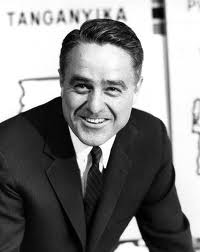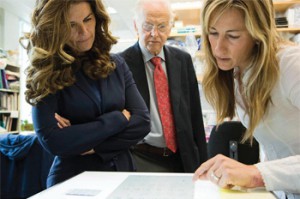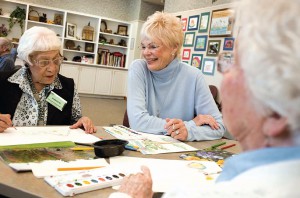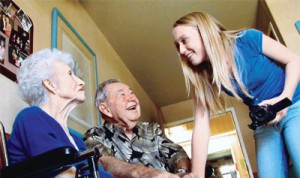January 20, 2011

The Directors of the Fisher Center for Alzheimer’s Research Foundation ask that you take a moment to remember Robert Sargent Shriver, Jr. who passed away Tuesday, January 18, 2011 with Alzheimer’s disease. His legacy will be remembered for his outstanding contributions to public service. Shriver was the founding director of the Peace Corps. He also served President Lyndon Johnson as director of the War on Poverty, creating programs such as Head Start, Job Corps and VISTA. His innovation and vision as a great American is an inspiration to us all. We remember him today with “A Conversation with Maria Shriver” and honor his legacy through her programs for Alzheimer’s patients and their loved ones.
We talked to the First Lady of California about The Alzheimer’s Project and her hopes for an Alzheimer’s cure in the near future. Below is an excerpt from her interview published in the summer issue of our Preserving Your Memory magazine, written by Tamekia Reece:

As a mother of four, a bestselling author, award-winning journalist and wife of California Gov. Arnold Schwarzenegger, Maria Shriver leads a very busy life. Despite her hectic lifestyle, there’s one issue for which Maria always sets aside time: being an advocate in the fight for Alzheimer’s education and research for a cure.
Getting the word out about this ravaging disease is a personal matter for Maria. Six years ago, her dad, Sargent Shriver, was diagnosed with Alzheimer’s. Sargent Shriver was the founding director of the Peace Corps and creator of VISTA (Volunteers in Service to America), Job Corps, Head Start and many other socially conscious programs. While watching her father’s condition deteriorate and realizing “there was little information—and even less hope,” Maria took it upon herself to be a voice of compassion, education and hope for families struggling with Alzheimer’s.
In May 2009, HBO debuted The Alzheimer’s Project, a four-part documentary, for which Maria served as the executive producer. As a multi-format project, The Alzheimer’s Project also includes a companion book, DVD of 15 short supplemental films, a website, and a nationwide community-based information and outreach campaign.
Preserving Your Memory (PYM): The Alzheimer’s Project is a series of films focusing on many different aspects of Alzheimer’s. How did the project come to be?
Maria Shriver: The project was produced by HBO, and was really the brainchild of Sheila Nevins [president of HBO Documentary Films] and [producer] John Hoffman. In 2004, after I had written a book on Alzheimer’s for children, I had gone to HBO and proposed an Alzheimer’s special, but they didn’t want to do it because they didn’t think the time was right. Then, when they saw the numbers growing so dramatically, they decided that the time was right and they called me back and said, ‘”Do you still want to work on this? Are you still interested?” I said yes, I was, and off we went. They decided to make it an across-the-board project that would deal with science, children, caregivers, and living with the disease and an accompanied book, and DVD projects. So, it’s bigger and better than I ever imagined.
PYM: Research has shown that a person with a family history of Alzheimer’s is more likely to develop the disease. Are you afraid of getting Alzheimer’s?
Maria: Yes, I am. And I think anybody else in America, whether they have a loved one with Alzheimer’s or not, should be afraid of getting Alzheimer’s because we’re living longer lives and that increases our chances of getting Alzheimer’s. I guess that’s the downside [to living longer lives]. The upside is that we can change that, and we can make this our generation’s cure. Just like generations before us found a way to prevent polio, we can find a cure for Alzheimer’s if we come together, get motivated, and pressure this government and private enterprise to come together and try to find a cure, which I hope will happen.

PYM: So, what are you doing health-wise to try to prevent Alzheimer’s?
Maria: Well I try to exercise. I try to keep my heart healthy, because there’s a direct correlation between your heart and your brain. I try to keep my social circle broad. I try to eat right and I pray. I pray that I don’t get Alzheimer’s. And I try to use my voice to pressure the government to allocate funds so that we can find the cure. I think that’s all you can do.
PYM: One of the segments in the series is The Memory Loss Tapes, which gets the point of view of the person with Alzheimer’s. Why was this approach taken? Oftentimes when we hear about Alzheimer’s it’s from the point of view of the family and friends of the person with the disease.
Maria: Well, I think because [the documentary is] four hours [long] it was a chance to hear from grandchildren, it was a chance to hear from caregivers, and it was a chance to hear from scientists, but it was also a chance to hear from people who actually have the disease. They can tell us more than probably anybody. Scientists approached it from their point of view; caregivers approach it from their point of view and people who are diagnosed with it approach it from a completely different point of view. So this being a massive project, we were allowed the opportunity to cover all of those different aspects.
PYM: For viewers who watch the documentary, what effects do you think it will have on them hearing what the person with Alzheimer’s is actually experiencing in his or her own words?
Maria: I think it might scare them a little bit and it might make people a little uncomfortable. But hopefully it will maybe scare them enough to think, “Uh oh, I don’t want to get this, so maybe I’ll get involved in trying to find a cure.” That’s what I’m hoping.
PYM: You mentioned your children’s book.
Maria: It’s called “What’s Happening to Grandpa?” and it came out in 2004 [and was published by Little, Brown]. It’s a book designed to explain Alzheimer’s to children, but it works for adults, too.
PYM: The Alzheimer’s Project also includes a segment titled “Grandpa, Do You Know Who I Am?”
Maria: Yes, one of the hours of the project is devoted to explaining Alzheimer’s to children of all ages, and that’s the one part that I appear in as well.

PYM: What prompted you to write the book, and why was “Grandpa, Do You Know Who I Am?” included in the documentary? Do you think children and teens are sometimes overlooked when it comes to coping with a loved one who has Alzheimer’s?
Maria: What drove me to write the book was that [after] my dad was diagnosed with Alzheimer’s, there wasn’t anything out there explaining it to children. So, that’s why I wrote the book. [The topic] was included [in The Alzheimer’s Project] because that’s the first thing I had pitched [to HBO] and there are estimates that there are over a quarter of a million young people and children taking care of grandparents at home with Alzheimer’s. So, children understand Alzheimer’s. They know about it. Seventy percent of the people with Alzheimer’s that are cared for at home are living across generations, and as I said earlier, this is a family disease and it affects people of all ages. So, it was very important to me that we include the young people, because they have a lot to say about it and we have a lot to learn from them about it.
PYM: When your own father was diagnosed, how did your children take it? Did they ask you questions that you didn’t know the answers to or weren’t sure how to answer?
Maria: Yes, they asked me lots of questions. In my book I kind of wrote to their questions and I wrote some of their answers. We’ve kind of been talking about it ever since he was diagnosed, and I think we’ll keep talking about it because it keeps changing, so you have to keep talking.
PYM: So, after your father’s diagnosis, how did you educate yourself so that you could answer your own questions and those of your children?
Maria: Well, I read about it, I talked to people about it, I talked to doctors, and I talked to people who were also children [of parents with Alzheimer’s]. That was really all I did because the Internet wasn’t what it is today. But I think you just ask questions and you kind of become a reporter and just try and learn as much as you can.
PYM: Speaking of research, the series also includes a segment called “Momentum in Science”, which you mentioned before is a look at some of the work being done in research laboratories. How does this part of the documentary serve families struggling with Alzheimer’s?
Maria: I think it gives them hope to know that there’s a lot of research that is being done. There are a lot of dedicated doctors, scientists and researchers in small laboratories and big laboratories all over this nation who are working to find a cure. So, I hope it will give families hope that we are trying to find a cure. People are trying to find a cure. It will encourage families to perhaps lobby their government leaders to fund more research. Because that’s where the cure is going to come from. It’s not going to come from us sitting around talking about it. It’s not going to come from a television special. It’s going to be some doctor somewhere who’s researching in an unknown place who holds the key to the cure.
PYM: Overall, what do you hope to accomplish with The Alzheimer’s Project?
Maria: Well, I hope it will get people talking about the disease. I hope it will lift some of the shame or embarrassment of the disease, and I hope it will make people feel that there is hope on the horizon and that they’re not alone in dealing with this.
Inside The Alzheimer’s Project:
- “The Memory Loss Tapes”– The first part of The Alzheimer’s Project, The Memory Loss Tapes, brings viewers into the world of seven patients living with Alzheimer’s, each in an advancing state of dementia and across the full spectrum of the disease. In their own words and actions, the Alzheimer’s sufferers share what it’s like to lose their independence and slowly lose one’s mind. Among the emotionally gripping stories: a woman in a nursing home who thinks her mirrored reflection is her “best friend”; a father who no longer can remember his family, but can still steal the spotlight when performing in public with a local vocal group; a daughter who must build a fence around her farm to prevent her mother from wandering off; and the one-time host of a kids’ TV show.
- “Grandpa, Do You Know Who I Am”? With Maria Shriver– Based on her book, What’s Happening to Grandpa? (available from booksellers everywhere), and her own experiences with her father, Sargent Shriver, Maria Shriver provides commentary and guidance in five lessons for ways grandchildren can cope with the experiences of having loved ones who have Alzheimer’s. The film gives viewers a look into the lives of children and teens facing their grandfather’s or grandmother’s illness.
- “Momentum in Science“- Although the first two parts of The Alzheimer’s Project are sure to produce tears, Momentum in Science, a two-part documentary, offers a glimmer of hope. Momentum in Science takes viewers inside the laboratories and clinics of 25 leading scientists and physicians, revealing some of the most cutting-edge research advances.
- “Caregivers”– When a person is diagnosed with Alzheimer’s, it affects the whole family, especially the members that take on the role of caregivers. Caregivers is a collection of five family portraits of caring at different stages of Alzheimer’s disease. The film highlights the sacrifices, struggles and successes made by those experiencing their loved ones’ descent into dementia.











